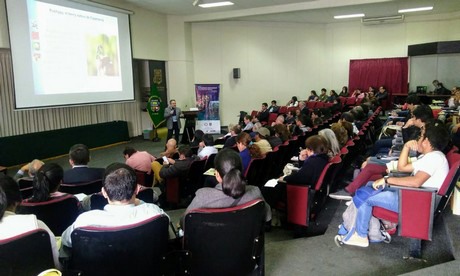Alfonso Velasquez Tuesta, a renowned Peruvian agro-export entrepreneur, former president of Sierra and Selva Exporter and former head of ADEX, participated in the First International Seminar on Native Berries, which took place on Thursday, August 22 at the National Agricultural University La Molina (UNALM). There, Velasquez Tuesta compared the pushgay, a Peruvian native berry that has a great commercial potential because its antioxidant capacity is higher than that of the blueberries that Peru currently exports, along with the Maqui, a Chilean native berry that is currently in fashion thanks to its powerful antioxidant capacity.

According to Velasquez Tuesta, the pushgay could become the Peruvian superfruit for export and a highly profitable future business for small and medium-sized producers in the country, especially in the Andean region of Cajamarca, which the INEI currently considers is the department with the highest incidence of monetary poverty in Peru.
Velasquez spoke about the antioxidant and nutraceutical properties of the pushgay. It contributes to the reduction of cerebrovascular accidents and neurodegenerative diseases that can be an excellent option to treat endometrial cancer, as it acts in a similar way to a drug used during the chemotherapy process.
Domestication
According to Alfonso Velasquez, domesticating these native berries is the key to developing their potential. That's why he spoke about the 'Domestication of Native Berries of Cajamarca, related to the Blueberry, through the use of biotechnological tools' project, which began two years ago under the national Peru Berries program of Sierra and Selva Exportadora. It is currently being developed by the Center for Research in Genetic Resources, Biotechnology and Biosafety (CIRGEBB) of the UNALM, with funding from the National Agrarian Innovation Program (PNIA).
Velasquez highlighted the decisive role played by the State University of Talca (Maule Region-Chile) and the Foundation of Chile (a private institution), as well as other Chilean companies and institutions, in the domestication of Maqui. "They conducted research and made bromatological studies of the Maqui to be able to produce it on an industrial scale. As of 2017 three new varieties have begun to be commercialized that will allow the intensification of its production," he said.
"Why not do the same in Peru?" Velasquez Tuesta asked the audience. "Starting the process of domestication of our native berry is urgent so that we can obtain a new variety of purely Peruvian blueberry based on our pushgay," concluded the businessman.
Data
Maqui exports have increased in recent years thanks to its health benefits. In 2015, Maqui's exports amounted to US $ 4.5 million and more than 190,000 kilos. The following year (2016), sales grew to US $ 9.9 million and 433,000 kilos processed. The fruit was sent to Japan, South Korea, Italy, the United States, Germany, Australia, and Denmark, among other destinations.
For more information:
Lucy E. Arias Alarcón
Cel. 967747753
WhatsApp: 979133228
